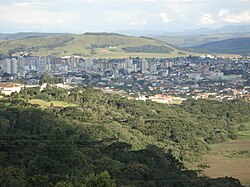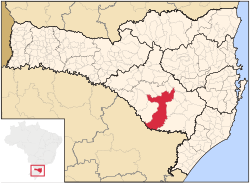Lages
Lages, Santa Catarina | |
|---|---|
 Skyline of downtown Lages | |
| Nickname: Princesa da Serra (Princess of the Serra) | |
 Location in the state of Santa Catarina and Brazil | |
| Country | Brazil |
| Region | South |
| State | Santa Catarina |
| Founded | November 22, 1776 |
| Government | |
| • Mayor | Elizeu Mattos |
| Area | |
• Total | 2,644.313 km2 (1,643.099 sq mi) |
| Elevation | 916 m (3,005 ft) |
| Population (2014) | |
• Total | 158,846 |
| • Density | 60.07/km2 (155.6/sq mi) |
| Time zone | UTC-3 (UTC-3) |
| • Summer (DST) | UTC-2 (UTC-2) |
| Website | Lages City Hall |
Lages, formerly Lajens, is a Brazilian municipality located in the central part of the state of Santa Catarina, in the region known in Portuguese as "Planalto Serrano".
It is located in the mountain region of the state and is the largest municipality of it. It is the main city of this region, and borders the towns of Otacílio Costa, São Joaquim, and Correia Pinto. The main course of urban water is Carahá River.
Lages hosts an annual festival called Festa do Pinhão, that is famous throughout the country.
Economically, the city is known for its strong cattle breeding and wood processing factories.
History
In the beginning of the 17th century, the arrival of the first Europeans established the town. The growing of the Campos de Lajens was due to the opening of roads to reach the fields of the state Rio Grande do Sul. The people of São Paulo and Minas Gerais were attracted to this region due to the cattle-breeding business with the gauchos.
Very primitive documents mention Lajens as a stop for horse riders that were traveling from Sorocaba or São Paulo, transporting mules, horses and cattle. Correia Pinto, the founder, was a horse rider, and ran cattle groups from Lajens to São Paulo.
On November 22, 1766, Lajens was promoted to state from village. In 1820 it detached itself from São Paulo to be part of the state of Santa Catarina. On May 25, 1860, it was elevated to city status. In 1960 the city's name was changed to Lages with a "g" wrongly inserted.
During the Revolução Farroupilha, Lages belonged to the state of Rio Grande do Sul.
Lages is served by Antônio Correia Pinto de Macedo Airport.
Gallery
-
View of the Catedral Diocesana
-
The azure jay (gralha azul) is the city bird
References




